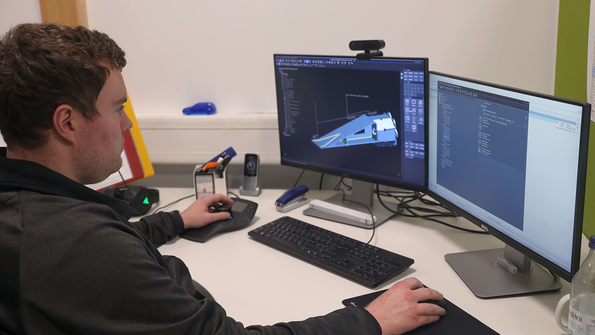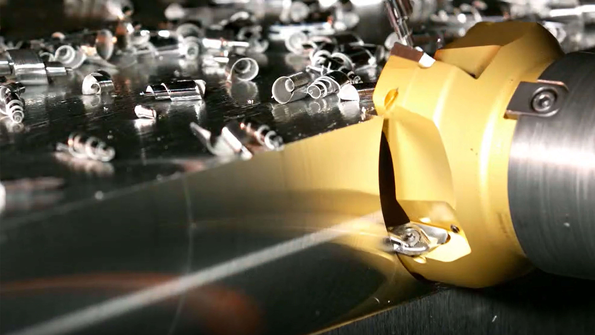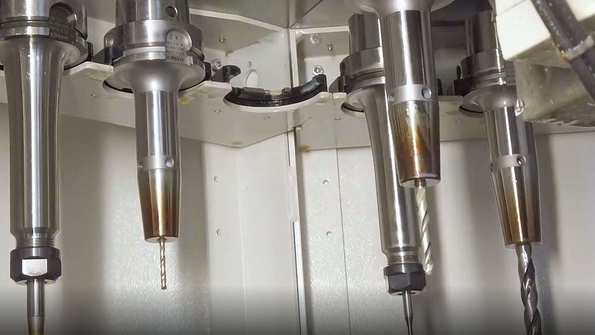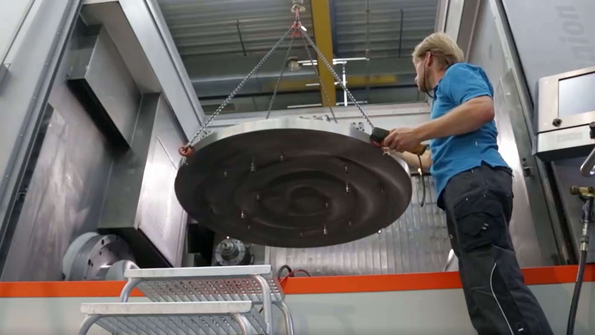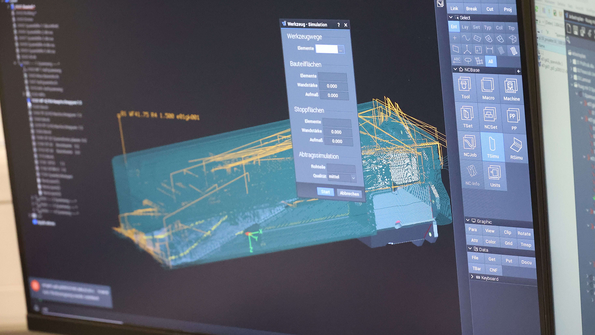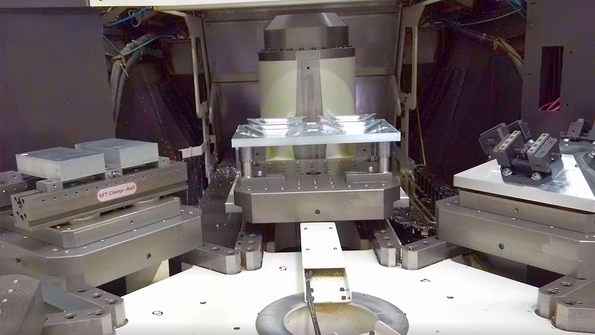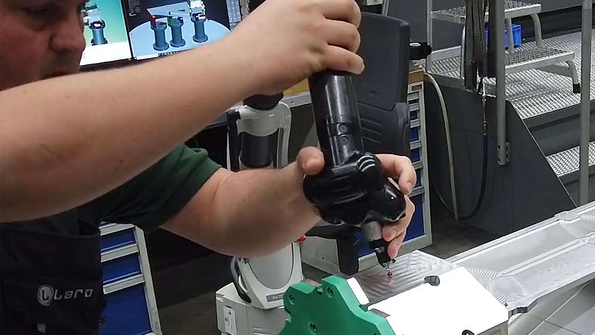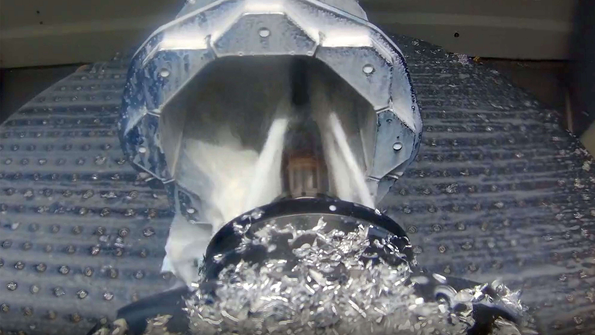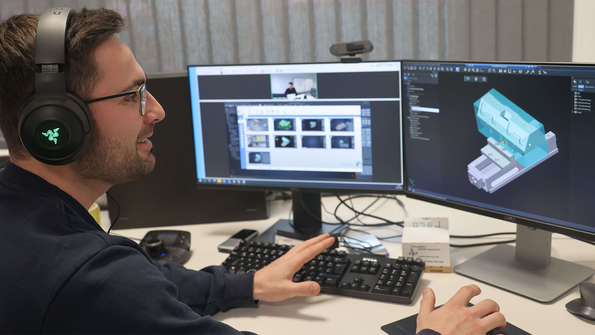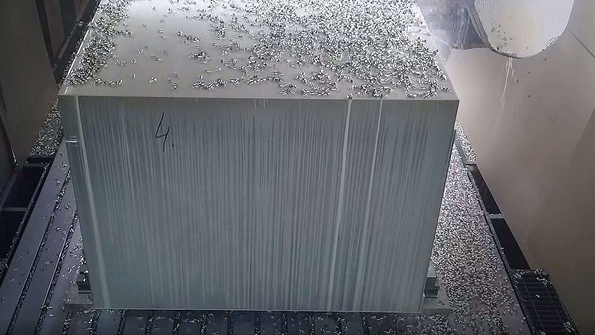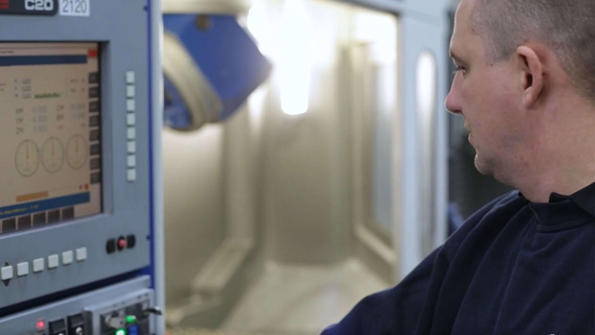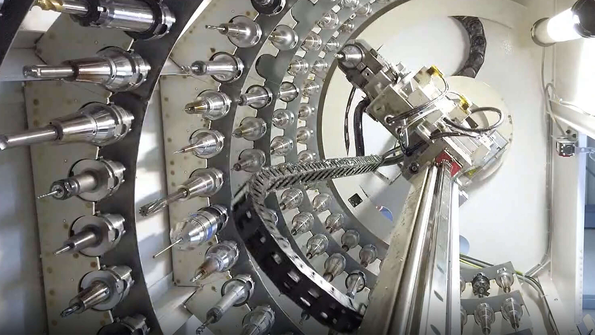-
Software
-
CAM software
- Tebis Automill
- CNC programming
- CNC automation
- CNC simulator
- Multiple setup
- Robotic machining
- CNC drilling
- Deep-hole drilling
- Combined turn-milling
- CNC turning
- Turn-milling
- 2.5D milling
- 3D milling
- 5-axis milling
- Slot milling
- Trimming
- HPC milling
- HFC milling
- Circle-segment cutters
- Sinker EDM
- Wire EDM
- 3D laser cutting
- Laser hardening
- Laser weld cladding
- CAD software
- CAQ software
- MES software
- Products
- Stories about parts
-
CAM software
- Services
- Consulting
- Sectors
- References
- Company
- News

-
 Home References
Home ReferencesTebis ensures process safety and stability at Laro
From structures for satellites and prototypes for the automotive industry to high-precision components for production machining – Laro's machinists are known for their high-precision implementation of even highly complex projects, and especially for their reliability and on-time delivery. The prerequisite is that all their processes and machines run exactly as planned. The machinists rely on Tebis for this reliability, because it allows them to design machining operations for safe, stable processing and above all for predictable results.
Company
Laro NC-Technik GmbH
Location
, on your computer
Focus
Reliable manufacturing processes
Benefits:
- Good usability and intuitive interface
- Templates and libraries save the accumulated experience
- Detailed simulation consistent with reality
- Productive night and weekend shifts
Sector
Aerospace
Model making
Mold manufacturing
Published
2022

Interviewee: Ralf Eberhard, Managing director
We’re very satisfied with the software package and with our contacts in support, service and training at Tebis. We feel that Tebis takes us seriously and treats us well: It's a partnership on an equal footing."Ralf Eberhard, Managing Director at Laro NC-Technik, IllmenseeAnd then it was always exciting on Monday morning to see if everything fit together. However, this uncertainty simply isn’t acceptable, especially when machining important, valuable and time-critical parts. Tebis now gives us the ability to safeguard everything in advance.Ralf Eberhard, Managing Director at Laro NC-Technik, IllmenseeThe cost of the material for the blanks alone can be in the six-figure range. A key aspect of the corporate philosophy at Laro, a subsidiary of the Langer Group, is therefore safe and also highly precise machining. “We work primarily in lot sizes of 1, so we only have one chance to get it right," says Ralf Eberhard, Managing Director of the specialist machining company in Illmensee, Württemberg. “We’ve therefore set up our production and especially our processes and procedures accordingly.”
Technical feasibility is just one factor. "It’s also important to have well-trained employees who have good ideas and can think outside the box," the managing director affirms. "They have many years of experience and solid practical knowledge, so they can also get the most out of our technical capabilities."A material spectrum ranging from plastics to tough alloys
Tebis provides proven and standardized machining suggestions in templates for a wide variety of part classes. These suggestions also contain all relevant strategies and parameters. The programmers then optimally adapt these suggestions to the individual parts. - Image: Pergler MediaThe materials the machinists work with range from plastics to CFRP and other composites, to aluminum and other non-ferrous metals, and tool steels, stainless steels, titanium and tough alloys. The range of required machining quality is just as broad, including everything from roughed parts to Class A surfaces.
This is also reflected in the company's production machinery. High-performance, high-precision gantry milling machines and machining centers enable parts weighing only a few grams up to 20 tons to be machined. The current maximum length is six meters. Another large machine that will extend the size of workpieces is being procured. The degree of metal removal is often very high. It's not rare for the volume of the chips produced to significantly exceed that of the part, especially for parts for the aerospace industry: for example, for satellites and probes.Constant-temperature production hall enables high precision
Maximum precision: The production building at Laro is maintained at a constant temperature of 21.5 °C. This allows successful machining of the workpieces using the optimized strategies and machining parameters stored in templates and libraries. - Image: LaroThe machinists are especially challenged by the parts manufactured in the production hall, which is kept at a constant temperature of 21.5 °C. They’re generally intricate and complex parts and parts that require significant manufacturing effort. They’re frequently for projects that other companies have already attempted in vain. The experts at Laro have a reputation for manufacturing even "impossible" parts at the highest precision.
Quality assurance plays a key role in the company. In addition to measuring on the machine and their own high-performance measuring machines, machinists also have access to the technology at the Langer Group. Large parts of up to eight m in length can be measured precisely there. This opens up the potential to manufacture highly complex and also very precise parts.Tebis ensures safe evaluations – right from the start
The libraries include all the tools used at Laro with all the relevant geometry parameters and the cutting data modified for a wide range of materials. This enables fast and flexible implementation in machining. - Image: Laro"There are some things even we can't do," explains Eberhard. "But we can very quickly and accurately evaluate what’s feasible and what the limits are for a potential customer." The machining specialists base this high degree of safety on their CAM program. Especially on the larger machines, those responsible at Laro have had good reason to rely on Tebis for more than two decades. In addition to its ease of use and intuitive interface, the depth of information in the system plays a very important role. When it comes to process reliability, process stability and predicting machining operations and their results in particular.
This provides for "nearly absolute safety in machining," Eberhard emphasizes – even in unattended operation. It enables the machinists to optimally utilize the available spindle time while still protecting them comprehensively and systematically from unexpected machining incidents.CAM system increases process safety and process stability
Programs no longer have to be adapted to the machine at: That’s all taken care of in advance. This gives the machine operator enough time to set up the next part in parallel with machining – then it's ready to go as soon as the machine is free. - Image: LaroAdmittedly, machines have also been operated over the weekend in the past, especially when working on large parts. "And then it was always exciting on Monday morning to see if everything fit together," Eberhard recalls. "However, this uncertainty simply isn’t acceptable, especially when machining important, valuable and time-critical parts. Tebis now gives us the ability to safeguard everything in advance. And this additional safety also benefits the machines that are automated with pallet changers. The system also lives and grows with our needs and requirements.”
One of the keys to safe and stable processing on the machines is detailed simulations that reflect reality. "We first check every relevant machining operation on the digital twin in Tebis," Eberhard explains. "The data must be very carefully maintained to ensure that the simulations correspond to machining in the real world. For example, this is the only way we can obtain valid statements about freedom from collisions in a machining operation."Precise virtual twin ensures valid simulation
In order to simulate reality on a one-to-one basis in the virtual world, experts from the software company in Martinsried, Germany carefully and precisely measured the machines at Laro. All cutting tools are meticulously registered. And the detailed libraries also include all the clamping devices, from fixtures fabricated in-house to the vacuum clamping system for distortion-free fixing of delicate parts. This results in a true digital twin that enables accurate collision control.
"This is how we can be certain that 'air' really is air," says Eberhard. "We ordinarily work with a safety distance of 10 mm: Process safety is a very important factor for us. Precise simulations enable us to work below this safety margin on especially challenging geometries. We can be confident that we’re still on the safe side."Laro uses many Tebis modules
Laro implements all technologies relevant to milling – from 2+3-axis milling to 5-axis simultaneous and 2.5-D machining – and uses the corresponding Tebis modules including the sophisticated interfaces. Their machining operations are highly standardized. Key strategies with optimal machining parameters are stored in templates.
"These templates and the libraries contain our accumulated experience from many different projects," Eberhard explains. "As we store all the relevant data and strategies there in increasing detail, the better the automated programming works.”
The sequences are automated and can cover simpler parts very well. However, more complex parts still require the expertise and experience of the well-versed programmers to optimize the automatically generated machining operations.The simulation accounts for all the relevant parameters in high detail. The machinists at Laro can therefore make valid statements about feasibility even before machining, for example, in the bidding phase – even for "difficult" and highly complex parts. - Image: Pergler MediaAll key data are already stored in the templates
Part checking with a measuring arm on the machine is one aspect of Laro's comprehensive quality assurance concept. This reliably ensures that all machined workpieces meet the customer's specifications in every way. - Image: Laro"For example, the templates for a cubic component include the basic machining elements," he continues. "The strategies are stored and the sequences are generally specified. Everything important for the project is already available – from the measurements to the appropriate process sequences.”
This type of automated programming using templates relieves the programmers at Laro of a lot of work. "Completely automated programming is utopian due to the complexity of our parts," the managing director affirms. " We’ve therefore created different templates for individual part families representing the key properties of each class. These serve as a solid starting point that our CAM experts can then carefully modify, refine and optimize for the specific part. This saves a lot of time, minimizes potential errors and significantly reduces the necessary effort."Comprehensive libraries prevent input errors
Aerospace components in particular can at times entail a very high degree of material removal and require significant machining expertise. Laro has established itself as a reliable partner for customers from a wide range of industries, especially for "difficult" parts. - Image: LaroThe comprehensive libraries provide valuable support in processing. The strategies and machining operations at Laro are largely standardized. All tools are optimized and stored with all the data. This also applies to the tools made in-house and special tools. Their parameters – from the individual components and the geometric data to the material-specific cutting data – are also incorporated in detail in the libraries, which enables their immediate use. And if a special tool ultimately becomes a standard tool, all the preliminary work has already been done.
"Another variable in addition to tools and materials is the selection of the machine we’ll use," adds Eberhard. "Tebis automatically adjusts the tool’s cutting data to the options available on the selected machine. This allows us to achieve the optimal result regardless of the spindle.” This procedure also enables a high degree of flexibility if those responsible suddenly have to reassign jobs: for example, due to urgent orders or a fault.
Tebis also ensures safety in these cases. The program detects in advance if a machining operation exceeds the limit switches of a specific machine or if a spindle is unsuitable for a large-diameter bore. The responsible personnel can then select a different machine that’s appropriate for the operation. This permits planning to be completed in advance. and the machining operations are safe right from the start.Safe foundation for continuous improvement
By the way, the strategies and parameters already established at Laro are in no way set in stone: "Our libraries and processes are alive and are under continuous development in the sense of an ongoing improvement process," Eberhard says. "This is why our CAM team leader is in continuous dialog with the programmers and machine operators. He checks any new technologies or strategies with his people. This lets us to respond very quickly, perform any necessary tests and easily adopt sensible new approaches. We modify any new developments in Tebis, and only then are they approved for processing on the machine.”
This type of machining has required some changes for the machine operators. "They’ve been relieved of the burden of responsibility for regularly adjusting programs to the machine," the managing director reports. "The programs are sent to the machine, the employee presses the start button, and that's that. They no longer have to worry about the routine of the actual machining operation and can instead pay more attention to optimizing the processes. This is where the employees’ strong qualifications are especially meaningful. And the potential of the machine also stays consistent at 100 percent. The programs are designed for this, and they’re rigorously tested on all critical parameters in the simulation."The employees can now concentrate on what’s important
The employees at the machines now have their heads and hands free for other tasks, like setting up new parts in parallel with machining. They have a Tebis Viewer available at the machine for this purpose. The machinist can also view the parts in 3D on the Viewer. This also ensures safety: for example, in the setup. The setup is therefore also fast and precise with no confusion. Tebis is also available to develop optimizations to improve the efficiency and quality of the machining operations.
This is a huge benefit. For example, shop employees know from experience if it's better to support a thin part on their machine in order to prevent vibration. "This information is incorporated in the system," Eberhard explains. "This is how we actively ensure that we can incorporate the knowledge and skills of our highly qualified employees in our standards, allowing us to continually optimize our machining processes.”
The outstanding preparation of the programs and the openness of Tebis give the machinists a high degree of flexibility. Especially when machining priorities are overturned by an urgent repair or a last-minute order. This permits machining operations to start even if the programs aren’t yet complete and are only loaded on the machine when they’re ready. This procedure prevents the unnecessary loss of time while still maintaining a high degree of safety.The scope of functions offered by the Tebis software package is very powerful. The experienced programmers at Laro also receive ongoing training to ensure that they always find the optimal solutions for their specific parts. Attending a Tebis online training. - Image: Pergler MediaWith a lot size of 1, you only have one chance to get it right. In part, this is because the cost of the material for the blanks alone can already be in the six-figure range, depending on the material. It’s therefore a major advantage if the machining operations are protected in advance with simulations. - Image: LaroTebis provides expert consulting for its customers
However, the benefits of Tebis aren’t withheld until the actual machining. The standardized machining expertise in the system lets the machinists relatively easily provide their (potential) customers with extremely solid advance technical consulting.
"When I submit a bid, we’ve already fully tested its feasibility and the machining in Tebis in advance," Eberhard says. "A potential customer can therefore be sure that they’ll receive their part from us in the specified time frame and at the required quality. We can rely on Tebis for that. And our experience plus the potentials of the CAM system now let us start the process with our customers much sooner, which also gives us better more opportunities to define I together.”
The CAM experts at Laro are already making very good use of the Tebis software and its benefits. But this doesn't just happen by itself: "Tebis offers very powerful and diverse options," says Eberhard. "In addition to basic Tebis training and experience in our daily work, our programmers regularly improve their knowledge in training courses. This helps us to get the very best from Tebis. We’re very satisfied with the software package and with our contacts in support, service and training at Tebis. We feel that Tebis takes us seriously and treats us well: It's a partnership on an equal footing.”“
Richard PerglerLaro employees are highly qualified. They receive ongoing training to ensure that their knowledge is current. This means they can always develop and implement the optimal solutions for their customers' challenges. - Image: LaroProfile
Laro NC-Technik GmbH
Laro is a subsidiary of the Langer Group. In its climate-controlled production building, the machining specialist manufactures thin-walled free-form components, dies, models and gauges as prototypes, single parts and small and medium series. The spectrum of materials ranges from aluminum and steel, titanium, various tough alloys, and GFRP and CFRP to a wide range of composites. Their customers come from many different industries. The spectrum extends from aerospace and automotive to demanding general production machining and medical technology. A significant portion of Laro's manufacturing includes parts for the Langer Group. As a system supplier, Laro also performs design and assembly tasks.Focus
True digital twin
Tebis experts scan and measure the user's machines on site and model them one-to-one in the Tebis programming environment. The virtual model includes machine geometry, additional units and kinematics, limit switches, dynamic parameters for axes and drives and much more. The Tebis specialists individually approve each virtual machine model on-site. The tool library also represents the real tools with all their geometric and technical properties. The experts assign proven and optimized cutting data like appropriate feed rates and spindle speeds to every tool for each relevant material. Calculated NC programs therefore contain the optimized cutting data for each operation. True-to-life detailed digital twins allow users to work more precisely and efficiently in manufacturing and to draw valid conclusions about aspects like the feasibility of a complex part even before machining.Perspective
Be predictable as a partner
Especially in a time when time pressure is increasing, reliable statements about feasibility and timelines are worth their weight in gold for customers. Laro offers a high degree of reliability – not least thanks to valid simulations in Tebis. With skilled and active support from the experts at the software provider, Laro employees ensure that the virtual twin of their production always matches the real world. Users can only achieve results that precisely correspond to reality with a highly accurate model – and with Tebis's sophisticated simulation technology. This makes Laro a reliable, predictable partner that delivers on its promises, even when it comes to "impossible" parts. Richard Pergler


